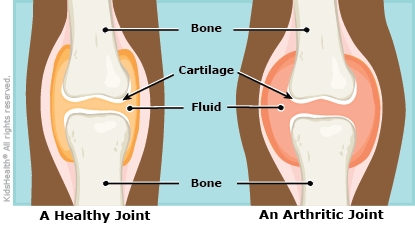Juvenile Idiopathic Arthritis (JIA): How to Care for Your Child
Juvenile idiopathic arthritis is a long-term condition, but it usually can be well controlled with treatment.


Juvenile idiopathic arthritis, JIA for short, is a kind of arthritis that occurs in kids and teens. It is a long-term condition that can cause joint stiffness, pain, and swelling. For a child to be diagnosed with JIA, there must be a history of arthritis that has lasted 6 weeks.
There are different types of JIA, which involve different numbers of joints. In some cases, the whole body is involved. Kids with some types of JIA may have other symptoms, like fever, weight loss, or rashes.
The cause of JIA is not known, but may involve something (like a virus) triggering the immune system (which normally fights infection) to attack the joints instead. When this happens, there can be inflammation (swelling). Over time, if the swelling isn't treated it can cause loss of cartilage in the joints.
The health care provider asked you and your child questions, did a careful examination, and ordered blood tests. This information helped the health care provider diagnose your child with JIA.
Often, the disease has periods of remission when symptoms disappear and flares when symptoms get worse. Your child's health care provider will adjust the treatment in order to reduce symptoms and prevent long-term problems.

-
Your child should take all medications as instructed by the health care provider.
-
Encourage your child to get plenty of exercise, which can keep muscles toned and help prevent joints from getting too stiff. When a joint is painful and swollen, non-weight-bearing exercises like biking and swimming are good options. A physical therapist can help develop an exercise program that is appropriate for your child.
-
Encourage a well-balanced diet that includes calcium-rich foods to help avoid weakened bones.


-
Your child's symptoms seem to be getting worse or are not getting better.
-
Your child has side effects from the medication.
-
Your child has new symptoms.


-
You may find it useful to learn about Federal Act, Section 504, which offers special help at school for kids with conditions like JIA.
-
Look online or ask your health care provider about a support group for kids with JIA.